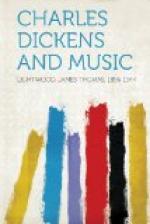when he heard her sing the first one, on the first occasion of his seeing her beneath the parental roof, she had attracted his attention in an extraordinary degree, but that when it came to ‘Little Tafflin,’ he had resolved to win that woman or perish in the attempt.
It will be remembered that Mr. Bucket (B.H.) gained a wife by a similar display of vocal talent. After singing ’Believe me, if all those endearing young charms,’ he informs his friend Mrs. Bagnet that this ballad was
his most powerful ally in moving the heart of Mrs. Bucket when a maiden, and inducing her to approach the altar. Mr. Bucket’s own words are ’to come up to the scratch.’
Mrs. Micawber’s ‘Little Taffline’ was a song in Storace’s ballad opera Three and the Deuce, words by Prince Hoare. It will be interesting to see what the song which helped to mould Micawber’s fate was like.
LITTLE TAFFLINE.
[Figure 5]
Should e’er the fortune
be my lot
To be made a wealthy bride,
I’ll glad my parents’
lowly cot,
All their pleasure and their
pride:
And when I’m drest all
in my best,
I’ll trip away like
lady gay,
I’ll trip, I’ll
trip away.
And the lads will say, Dear
heart, what a flash!
Look at little Taffline with
a silken sash,
And the lads will say, Dear
heart, what a flash!
And the lads will say, Dear
heart, what a flash!
Look at little Taffline, Look
at little Taffline,
Oh, look at little Taffline
with the silken sash!
There was also a character called Little Taffline in T. Dibdin’s St. David’s Day, the music for which was compiled and composed by Thomas Attwood, organist of St. Paul’s Cathedral.
Her other song, ‘The Dashing White Sergeant,’ was a martial and very popular setting of some words by General Burgoyne.
Micawber could both sing and hum, and when music failed him he fell back on quotations. As he was subject to extremes of depression and elevation it was nothing unusual for him to commence a Saturday evening in tears and finish up with singing ‘about Jack’s delight being his lovely Nan’ towards the end of it. Here we gather that one of his favourite songs was C. Dibdin’s ‘Lovely Nan,’ containing these two lines:
But oh, much sweeter than
all these
Is Jack’s delight, his
lovely Nan.
His musical powers made him useful at the club-room in the King’s Bench, where David discovered him leading the chorus of ‘Gee up, Dobbin.’ This would be ‘Mr. Doggett’s Comicall Song’ in the farce The Stage Coach, containing the lines—
With a hey gee up, gee up,
hay ho;
With a hay gee, Dobbin, hey
ho!
‘Auld Lang Syne’ was another of Mr. Micawber’s favourites, and when David joined the worthy pair in their lodgings at Canterbury they sang it with much energy. To use Micawber’s words—




